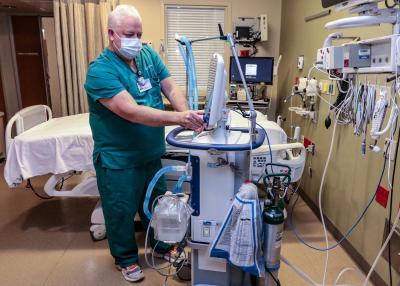Published on February 25, 2022
'The battle still rages' -- Respiratory therapist talks life in the COVID-19 unit
By Christie Netherton Messenger-Inquirer

Stephen Nofsinger, a certified respiratory therapist, has been working in the COVID-19 wing at Owensboro Health Regional Hospital since the beginning of the pandemic, a feat that has been both emotionally and physically trying, but that he feels called to continue.
Nofsinger has worked at OHRH for about five years. When his supervisor came into his department in the early months of 2020 asking for volunteers to work the COVID-19 wing, he volunteered immediately, feeling that he should be there to help in what he called “the biggest healthcare crisis of our time.”
“I felt like I had to answer the bell; you just have to do it,” he said. “There were probably three or four of us that did. We didn’t know what we were getting into, we just knew it probably would be bad. We didn’t know how long it would last. We didn’t think it was going to last this long.”
As a respiratory therapist, Nofsinger’s role in patient care in the COVID-19 unit revolves around overseeing ventilators and breathing treatments for patients.
Patients in the COVID-19 unit requiring ventilation, he said, have fairly severe oxygen needs.
Generally, a patient on a ventilator might have oxygen needs at about 40-50%, while a COVID-19 patient’s oxygen needs might be closer to 80-100%.
Nofsinger said he vividly remembers the first COVID-19 patient admitted into the facility in March 2020.
“I remember walking down this very hall out here to take a ventilator down the hall, and it was very scary,” he said. “We didn’t know what to expect. It was a hard time.”
Working in the COVID-19 wing has not become much easier the past two years, as healthcare workers continue battling surges, working long hours and seeing more and more patients struggling and ending up on ventilators.
Yet each day, Nofsinger and many others in the COVID-19 unit continue showing up to care for patients.
Nofsinger begins his work each day around 7:30 a.m., “gowning up” with full protective equipment, including gloves, an isolation helmet, a gown and feet covers, before beginning his first rounds, which typically last for about three to five hours, a process which he repeats several times throughout the day alongside a doctor.
“It’s a hard, physical job,” he said. “I worked a lot more in the past two years than I have in the previous four or five years.”
Not only has he worked more, he said, but he has seen many more patients, and those patients have been in a more critical condition than he has ever seen before, which takes a toll emotionally and physically on those working in the unit.
“It’s hard. We’re working through a long surge,” he said. “I think last summer, we got down to a minimal amount of patients in the CCU (critical care unit), and we thought we may have been over the hump. I think everybody thought that, and then it started up again slowly, then it really, really surged.
“You just have to consciously tell yourself that this is your job, you have to do it, and you have to really manage your time. It can be disheartening a little, but you just have to be strong.”
Nofsinger said he never expected to be affected emotionally in the ways he has been.
“I thought I would never, ever break down,” he said. “I thought I was a tough guy, but it happened out of the blue one day. A year and a half of it really got me.”
Nofsinger said he has tried to compartmentalize his work by making sure he is taking care of himself mentally and physically and spending time with his family.
“I think what comes into play is, you have to do stuff for yourself on the side,” he said. “You have to do things and make time for your own health.”
He said he still wants to continue his work, but wants the public to understand how critical the situation is and requests that those who are not vaccinated get vaccinated.
People are still very sick, he said, and the virus is still a strain on healthcare resources.
“There’s just nothing that compares to this — nothing at all,” he said. “It’s still going on — the battle still rages.”
Christie Netherton, cnetherton@messenger-inquirer.com, 270-691-7360
About Owensboro Health
Owensboro Health is a nonprofit health system with a mission to heal the sick and to improve the health of the communities it serves in Kentucky and Indiana. The system includes Owensboro Health Regional Hospital, nationally recognized for design, architecture and engineering; Owensboro Health Muhlenberg Community Hospital; Owensboro Health Twin Lakes Medical Center; the Owensboro Health Medical Group comprised of over 350 providers at more than 30 locations; four outpatient Healthplex facilities, a certified medical fitness facility, the Healthpark; a weight management program, and the Mitchell Memorial Cancer Center.
On average each year, we have more than 19,000 inpatient admissions, deliver 2,000 babies and provide the region’s only Level III NICU. Owensboro Health physicians perform nearly 33,000 surgical procedures, including nearly 150 open-heart surgeries. Our physicians and staff have 90,000 Emergency Department visits and more than 1.25 million outpatient visits annually. Visit our home page for more information.